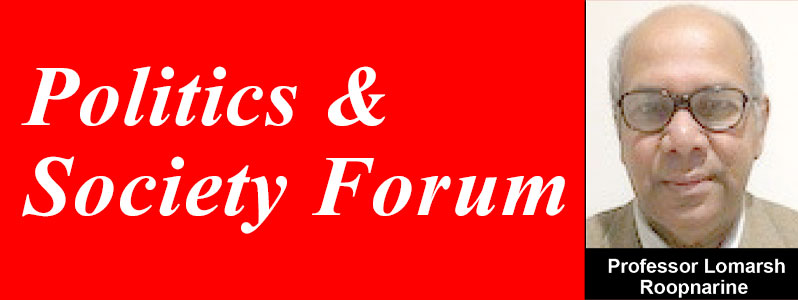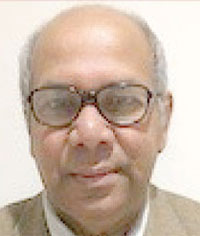IN anticipation of the first anniversary of Guyana’s general election impasse, I asked Dr. Ramesh Gampat to do a short interview with me on his recently published book Guyana’s Great Downswing, 1977-1990: Socio-Economic Impact of Co-operative Socialism. The timing of Dr. Gampat’s book could not have come at a better time given the political shenanigans in the National Assembly. Dr. Gampat is an Economist who has worked for about three decades with the United Nations Development Programme.
Lomarsh Roopnarine (LR): Can you explain to readers what has inspired you to write this book that speaks to the reality of Guyana’s economic, political, and social situation?
Ramesh Gampat (RG): First, Professor Roopnarine, thanks a million for taking time off your busy schedule to talk to me.
I was motivated to write the book for several reasons, including the fact that little research has been published on the period 1977-1990, that those years were probably the longest contraction ever of Guyana’s economy, that the downswing was caused principally by one man’s – Forbes Burnham – hunger for power, which unleashed ethnic, political, and socio-economic consequences that have strengthened over time and now threaten to tear the country apart.
The GD was part of the first 28 years of the PNC and encompassed the years of authoritarianism, a planned economy and a conundrum called “Co-operative Socialism,” which was really a bastardisation of African Socialism. What else can socialism be if not cooperative? The point is that Burnham conjured up out of thin air all manner of shenanigans to disguise his plans to capture the state and empower himself for life.
LR: Why did you title the book Guyana’s Great Economic Downswing?
RG: The GD refers to the 14 years from 1977 to 1990. It was not a recession, which refers to a significant decline in general economic activity for two consecutive quarters. The decline in Guyana lasted 40 quarters! Guyana’s economy was in a freefall for 14 years.
LR: I am impressed with your economic analyses, statistics, graphs, and equations you have provided in the book. I must admit this information is above my head. So, can you explain, from a layman’s perspective, a few main points of the Great Economic Downswing?
RG: Interestingly, the GD was preceded by a long upswing and followed by seven years of very high growth. At the end of the GD, ended in 1990, real GDP was 30.5 per cent smaller than when the economic tsunami began in 1977. When the GD ended, real income of the average Guyanese was US$1,497 compared to US$2,100 when it began.
LR: You have done an excellent job in analysing political and economic data to demonstrate how Guyana has been trapped in tribalism. Can you explain tribalism in the context of Guyana?
RG: In the case of Guyana, political tribalism builds upon ethnicity and ethnic politics, imparting a higher degree of cohesiveness and more forcefully projecting and executing the chief mission that motivates the tribe. Political tribe is more sectarian, insular, belligerent, and aggressive than practitioners of ethnic politics. A tribe more forcefully seeks political domination via the capture of political power, state institutions, and would [hold] on to it by any means, including rigging elections and adopting confrontational positions that oftentimes lead to mayhem.
Tribalism distorts the way we think, feel, and behave; unconscious biases and emotion automatically hijack reason and rationality, magnified by a marked propensity to groupthink, so that ethics and morality do not apply outside of the tribe. Not all group identities are equally potent; some group identities exercise a stronger grip than others and are more politically galvanizing. Political tribalism is associated with numerous deaths, injuries, and destruction of property.
LR: You have argued that Guyana’s main political parties, and more so the PNC, have not been willing to accept defeat at the polls even with convincing evidence. Why do you think we have now a culture of not accepting the results of the polls?
RG: That is an important question, and it is tied to political tribalism. Africans believe they have a right to govern, a right to political power since they perceive that Indians have economic power. The goal is to prevent Indians from having both economic and political power.
The combination of winner-takes-all, zero-sum election framework and the larger Indian share of the population means that Africans cannot win a fair and free election. What, then, are the options? If the PNC cannot win a free election, they resort to conspiracy theories, fake news, untruth and irrationality, emotions, tribal beliefs; whatever they wish to believe or hear. If they cannot rig the election, then the second-best strategy is lies and deception.
LR: What was the impact of the great economic downswing on Guyana in terms of human development and growth?
RG: By encouraging tribalism, the GD encouraged violence, widespread corruption, ethnic plutocrats, kleptocrats and autocrats. These retard growth, deepens inequality, discrimination, marginalisation, and victimisation, and thus constrain human development.
LR: What would you like readers to know about your book? What is the takeaway?
RG: That the GD, rooted in political factors, can happen again! It drove an estimated 200,000 Indians abroad. Tribal politics and suspension of belief in facts, ethics and morality are creating the conditions for another one, which will have horrific demographic, economic and cultural consequences.
Summing up, Dr. Gampat’s views on Guyana’s political and economic situation are spot on. The recent exchange on the budget debate in the National Assembly between the main political parties has revealed more heckling, accusation, hooliganism, shouting matches, disgraceful behaviour, ineptitude, and skullduggery than progress. If this is not tribalism, then what is tribalism? The Great Downswing reinforces the aforesaid dynamics and reminds us that Guyana might cascade to a point of no return if adversarial (the tribal) elements (in our country) are not addressed more professionally and responsibly (lomarsh.roopnarine@jsums.edu).




.png)









